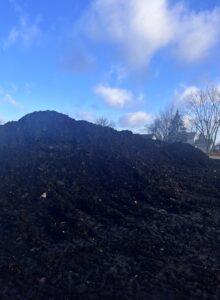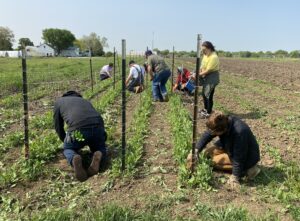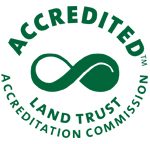By Russ Cerocke, Farm Manager
Bonafide and certified with no herbicide! At Green Earth Harvest, we grow food that is certified organic because we want our community to know that we do our best to provide responsibly grown food, and we can prove it! In order to maintain this certification, there are several guidelines to follow and costs that we incur. These guidelines, and the backing of the USDA, are what make ‘USDA Organic’ certification the most verifiable of food certifications.
I’d first like to speak to some of the rules we must follow. One requirement most are familiar with is the prohibition on synthetic pesticides which include: herbicides, fungicides, miticides, insecticides, and any other -icide you can think of. These are chemicals used to control pests like weeds, fungi, mites, and insects. Instead, organic farmers have a slew of other options in their toolbox for dealing with agricultural headaches. For instance, rather than using potent herbicides like RoundUp to eliminate weeds, organic farmers use cultivation, cover crops, natural mulches, and even some plastic mulches, all of which help to control weed pressure. We must also follow strict guidelines on complex crop rotations to avoid nutrient drain and pest accumulation. Cover crops are also required to feed and regenerate soil and to prevent erosion and nutrient leaching. Having living plants in the soil feeds it year-round so, the more we grow, whether cover crops or food crops, the healthier the farm becomes.
 Every year, organic farmers are required to have an on-farm inspection by a member of a third-party certification organization. In our case, it’s MOSA (Midwest Organic Services Organization). When the inspector visits, we are required to show all of our seed receipts and packets to prove we have used only un-treated, non-GMO seed. Our inspector will look through our harvest logs, field records, and compost records to ensure we are following their guidelines. Compost, for instance, must be turned at least 5 times in 15 days, while maintaining a temperature of 130-170 degrees Fahrenheit to ensure the compost is free of pathogens. After examining our records, the inspector picks a random crop to audit, following it from planting to distribution. The audit process helps to verify that we are indeed planting, growing, harvesting, and distributing the produce that is grown according to the standards. Finally, our inspector will walk the fields with us to be sure that we have planted according to the crop plan that we are required to submit before our season starts. The inspection process easily takes up an entire day here each season. If any part of our inspection does not verify our actions as described in our crop plan, we are at risk of losing our certification.
Every year, organic farmers are required to have an on-farm inspection by a member of a third-party certification organization. In our case, it’s MOSA (Midwest Organic Services Organization). When the inspector visits, we are required to show all of our seed receipts and packets to prove we have used only un-treated, non-GMO seed. Our inspector will look through our harvest logs, field records, and compost records to ensure we are following their guidelines. Compost, for instance, must be turned at least 5 times in 15 days, while maintaining a temperature of 130-170 degrees Fahrenheit to ensure the compost is free of pathogens. After examining our records, the inspector picks a random crop to audit, following it from planting to distribution. The audit process helps to verify that we are indeed planting, growing, harvesting, and distributing the produce that is grown according to the standards. Finally, our inspector will walk the fields with us to be sure that we have planted according to the crop plan that we are required to submit before our season starts. The inspection process easily takes up an entire day here each season. If any part of our inspection does not verify our actions as described in our crop plan, we are at risk of losing our certification.
The practices we have discussed all come with a cost, as everything does. The direct cost to us for certification is less than $3,000 a year. However, the economic cost of practicing organic farming is much higher. Besides the time spent keeping detailed records, which is good practice anyway, the biggest cost is that of labor. In order to eliminate and minimize the use of chemical inputs, we spend much more time with our crews in the fields. Weeding alone is 30% or more of the manual work being done on our farm every season. We are quickly expanding our use of organic leaf mulch to suppress weeds and protect soil, but this method is only so effective. For instance, leaf mulch is great at smothering annual weeds, but perennial weeds, like quack grass and Canadian thistle, have enough energy in their roots to power through a heavy layer of leaf mulch. The only way to eliminate them is good old-fashioned weed-pulling!
leaf mulch. The only way to eliminate them is good old-fashioned weed-pulling!
Ultimately, certifications are the best that society has come up with to provide reassurance to consumers as to how their food is being grown. The best way to know how your food is being grown is to know your farmer. Go out and visit local farms, ask about how and where their food is grown, and don’t be afraid to ruffle a few feathers! As responsible farmers, we appreciate being questioned about our practices, as long as it is done respectfully. We ourselves question the practices of modern food production, and what we have found inspires us to do better, one crop at a time.
We appreciate your interest in supporting responsible food production with us. Together, as farmers and consumers, we can set the stage for a change in the status quo. Ultimately, societal change requires change on an individual level, which is why we are happy to be on this journey with you, to a better tomorrow for us all.
Farmer Russ
Click here if you would like to learn all the details of the ‘USDA Organic’ requirements.



